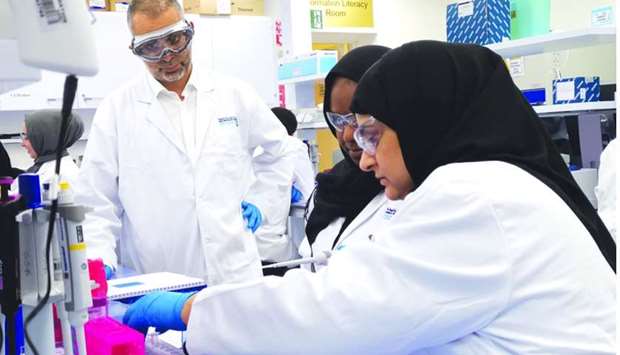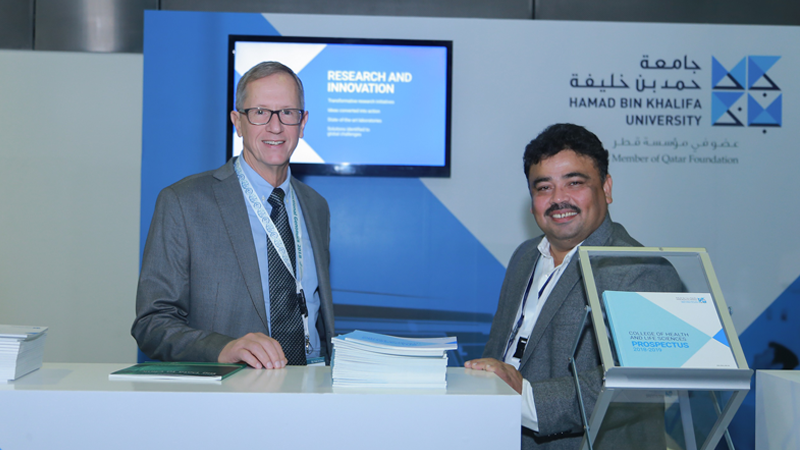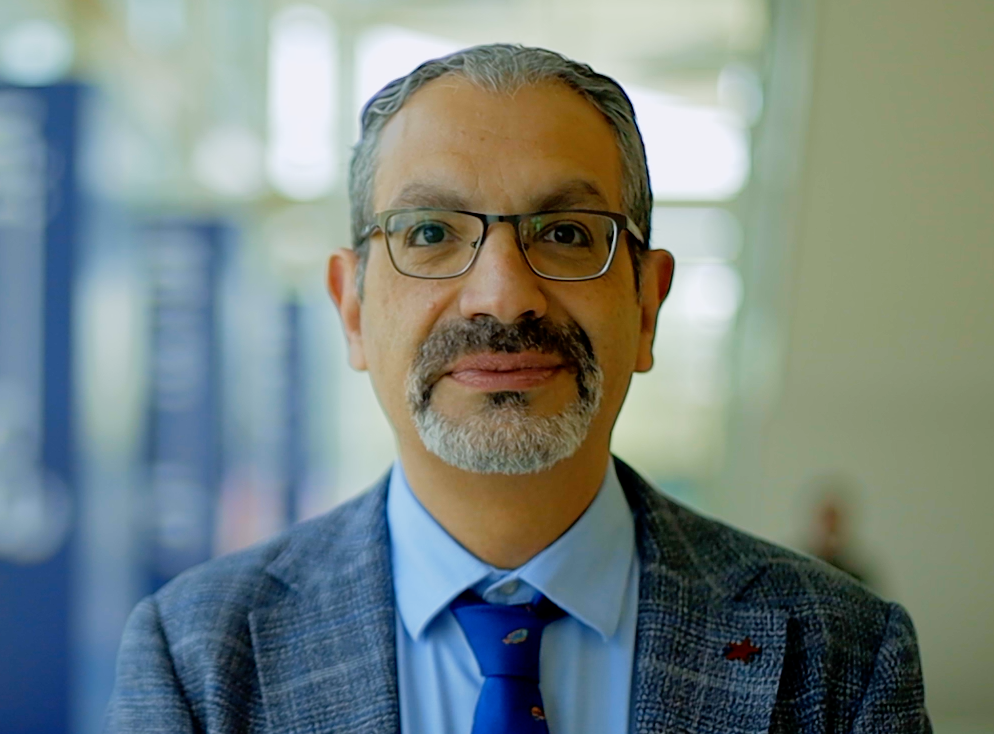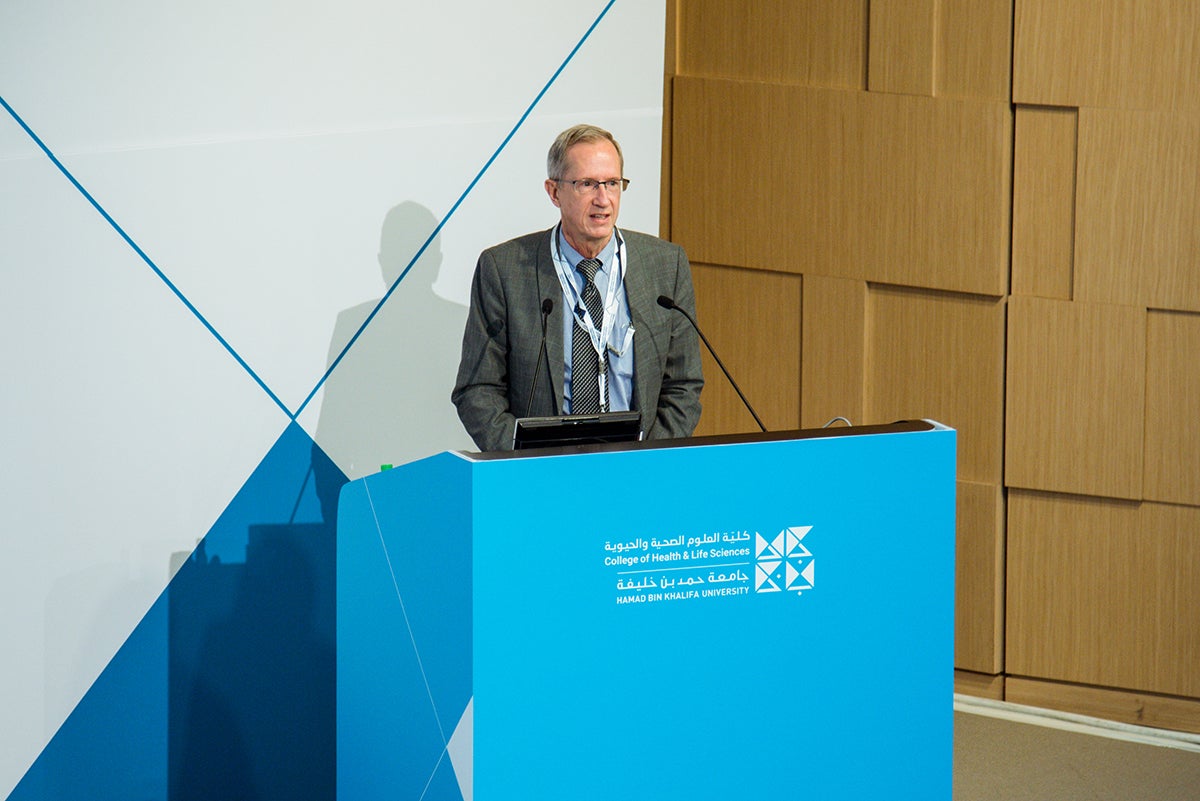
CHLS Leads Study on Medication Responses in Qataris
HBKU and Qatar Genome Research Consortium study how DNA affects safety and effectiveness of prescribed medicine

The College of Health and Life Sciences (CHLS) at Hamad Bin Khalifa University (HBKU) and the Qatar Genome Research Consortium have published the results of the first comprehensive study on how genetic variations in a Middle East population affect responses to medication.
Titled “A population study of clinically actionable genetic variation affecting drug response from the Middle East”, the research was led by Dr. Puthen Veettil Jithesh, Associate Professor at CHLS, and has been published online in npj Genomic Medicine, a leading open access scientific journal published by Nature Research.
Whole genome sequencing data from over 6,000 Qatari adults was analyzed to identify the frequency distribution of more than 1,000 pharmacogenes - genes that affect the way individuals respond to medications. A detailed analysis was also undertaken on 15 genes affecting 46 drugs to understand the clinical impact of genetic variability.
The study highlights a diverse distribution of clinically actionable pharmacogenomic variants in the Qatari population compared to other world populations. According to Dr. Jithesh, the findings indicate that 99.5% of the individuals studied have at least one clinically actionable genetic variability with a potential effect on the safety and effectiveness of medications.
“Given that several of these medications are widely prescribed in Qatar and in other parts of the world, our results have important implications for the clinical implementation of pharmacogenomics, which uses genomic data to predict whether an individual will respond to a specific drug or not,” he said.
Pharmacogenomics is a science that signals a shift from a “trial-and-error” way of prescribing medications to more precise prescription of medicines based on genetic makeup. The study’s findings are therefore helpful in planning for precision health implementation in Qatar.
Dr. Georges Nemer, CHLS Interim Dean, commented: “Understanding the Qatari genome and drug-associated gene variations has the potential to change the way we treat diseases and is key to precision health. This important study, in partnership with the Qatar Genome Research Consortium, is a major step forward in identifying high risk individuals and deciding on treatment. Equally, it emphasizes the importance of developing the capacity and specialized skills to take such findings forward, which is made possible through CHLS’ graduate programs in genomics and precision medicine.”
Related News

HBKU College of Health and Life Sciences and Equine Veterinary Medical Center Sign MoU
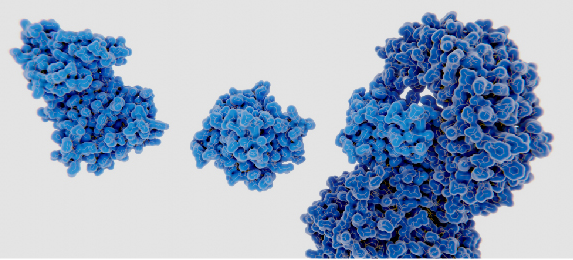
College of Health and Life Sciences Talk Spotlights Renowned Scientist’s Breakthrough on Cell Death-Driven Inflammation

Faculty at College of Health and Life Sciences Selected as Members of the Royal Society of Biology

HBKU’s College of Health and Life Science Researchers Awarded Two Major Grants
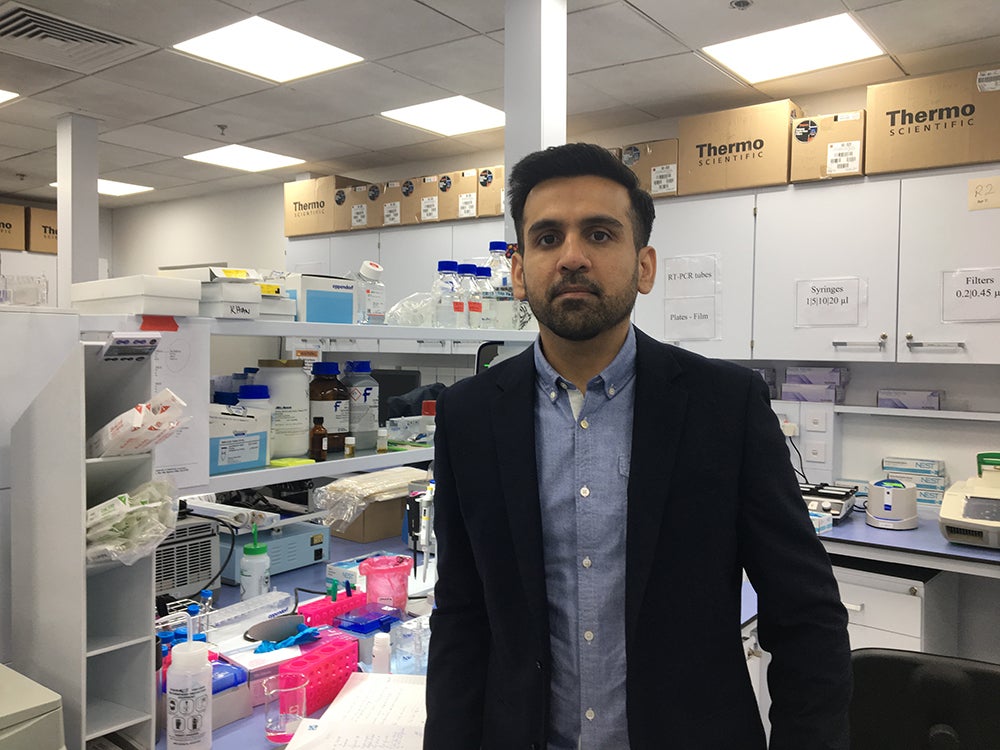
HBKU College of Health and Life Sciences Faculty Member Elected to Prestigious Biology Council

HBKU’s College of Health and Life Sciences Graduates Tackling Qatar’s Pressing Challenges

HBKU College of Health and Life Sciences and Equine Veterinary Medical Center Sign MoU

College of Health and Life Sciences Talk Spotlights Renowned Scientist’s Breakthrough on Cell Death-Driven Inflammation

Faculty at College of Health and Life Sciences Selected as Members of the Royal Society of Biology

HBKU’s College of Health and Life Science Researchers Awarded Two Major Grants

HBKU College of Health and Life Sciences Faculty Member Elected to Prestigious Biology Council

HBKU’s College of Health and Life Sciences Graduates Tackling Qatar’s Pressing Challenges

HBKU College of Health and Life Sciences and Equine Veterinary Medical Center Sign MoU

College of Health and Life Sciences Talk Spotlights Renowned Scientist’s Breakthrough on Cell Death-Driven Inflammation

Faculty at College of Health and Life Sciences Selected as Members of the Royal Society of Biology

HBKU’s College of Health and Life Science Researchers Awarded Two Major Grants

HBKU College of Health and Life Sciences Faculty Member Elected to Prestigious Biology Council

HBKU’s College of Health and Life Sciences Graduates Tackling Qatar’s Pressing Challenges

HBKU College of Health and Life Sciences and Equine Veterinary Medical Center Sign MoU

College of Health and Life Sciences Talk Spotlights Renowned Scientist’s Breakthrough on Cell Death-Driven Inflammation

Faculty at College of Health and Life Sciences Selected as Members of the Royal Society of Biology

HBKU’s College of Health and Life Science Researchers Awarded Two Major Grants

HBKU College of Health and Life Sciences Faculty Member Elected to Prestigious Biology Council

HBKU’s College of Health and Life Sciences Graduates Tackling Qatar’s Pressing Challenges

HBKU College of Health and Life Sciences and Equine Veterinary Medical Center Sign MoU

College of Health and Life Sciences Talk Spotlights Renowned Scientist’s Breakthrough on Cell Death-Driven Inflammation

Faculty at College of Health and Life Sciences Selected as Members of the Royal Society of Biology

HBKU’s College of Health and Life Science Researchers Awarded Two Major Grants

HBKU College of Health and Life Sciences Faculty Member Elected to Prestigious Biology Council

HBKU’s College of Health and Life Sciences Graduates Tackling Qatar’s Pressing Challenges

HBKU College of Health and Life Sciences and Equine Veterinary Medical Center Sign MoU

College of Health and Life Sciences Talk Spotlights Renowned Scientist’s Breakthrough on Cell Death-Driven Inflammation

Faculty at College of Health and Life Sciences Selected as Members of the Royal Society of Biology

HBKU’s College of Health and Life Science Researchers Awarded Two Major Grants

HBKU College of Health and Life Sciences Faculty Member Elected to Prestigious Biology Council

HBKU’s College of Health and Life Sciences Graduates Tackling Qatar’s Pressing Challenges

HBKU College of Health and Life Sciences and Equine Veterinary Medical Center Sign MoU

College of Health and Life Sciences Talk Spotlights Renowned Scientist’s Breakthrough on Cell Death-Driven Inflammation

Faculty at College of Health and Life Sciences Selected as Members of the Royal Society of Biology

HBKU’s College of Health and Life Science Researchers Awarded Two Major Grants

HBKU College of Health and Life Sciences Faculty Member Elected to Prestigious Biology Council

HBKU’s College of Health and Life Sciences Graduates Tackling Qatar’s Pressing Challenges

HBKU College of Health and Life Sciences and Equine Veterinary Medical Center Sign MoU

College of Health and Life Sciences Talk Spotlights Renowned Scientist’s Breakthrough on Cell Death-Driven Inflammation

Faculty at College of Health and Life Sciences Selected as Members of the Royal Society of Biology

HBKU’s College of Health and Life Science Researchers Awarded Two Major Grants

HBKU College of Health and Life Sciences Faculty Member Elected to Prestigious Biology Council

HBKU’s College of Health and Life Sciences Graduates Tackling Qatar’s Pressing Challenges

HBKU College of Health and Life Sciences and Equine Veterinary Medical Center Sign MoU

College of Health and Life Sciences Talk Spotlights Renowned Scientist’s Breakthrough on Cell Death-Driven Inflammation

Faculty at College of Health and Life Sciences Selected as Members of the Royal Society of Biology

HBKU’s College of Health and Life Science Researchers Awarded Two Major Grants

HBKU College of Health and Life Sciences Faculty Member Elected to Prestigious Biology Council

HBKU’s College of Health and Life Sciences Graduates Tackling Qatar’s Pressing Challenges

HBKU College of Health and Life Sciences and Equine Veterinary Medical Center Sign MoU

College of Health and Life Sciences Talk Spotlights Renowned Scientist’s Breakthrough on Cell Death-Driven Inflammation

Faculty at College of Health and Life Sciences Selected as Members of the Royal Society of Biology

HBKU’s College of Health and Life Science Researchers Awarded Two Major Grants

HBKU College of Health and Life Sciences Faculty Member Elected to Prestigious Biology Council

HBKU’s College of Health and Life Sciences Graduates Tackling Qatar’s Pressing Challenges

HBKU College of Health and Life Sciences and Equine Veterinary Medical Center Sign MoU

College of Health and Life Sciences Talk Spotlights Renowned Scientist’s Breakthrough on Cell Death-Driven Inflammation

Faculty at College of Health and Life Sciences Selected as Members of the Royal Society of Biology

HBKU’s College of Health and Life Science Researchers Awarded Two Major Grants

HBKU College of Health and Life Sciences Faculty Member Elected to Prestigious Biology Council

HBKU’s College of Health and Life Sciences Graduates Tackling Qatar’s Pressing Challenges

HBKU College of Health and Life Sciences and Equine Veterinary Medical Center Sign MoU

College of Health and Life Sciences Talk Spotlights Renowned Scientist’s Breakthrough on Cell Death-Driven Inflammation

Faculty at College of Health and Life Sciences Selected as Members of the Royal Society of Biology

HBKU’s College of Health and Life Science Researchers Awarded Two Major Grants

HBKU College of Health and Life Sciences Faculty Member Elected to Prestigious Biology Council

HBKU’s College of Health and Life Sciences Graduates Tackling Qatar’s Pressing Challenges

HBKU College of Health and Life Sciences and Equine Veterinary Medical Center Sign MoU

College of Health and Life Sciences Talk Spotlights Renowned Scientist’s Breakthrough on Cell Death-Driven Inflammation

Faculty at College of Health and Life Sciences Selected as Members of the Royal Society of Biology

HBKU’s College of Health and Life Science Researchers Awarded Two Major Grants

HBKU College of Health and Life Sciences Faculty Member Elected to Prestigious Biology Council

HBKU’s College of Health and Life Sciences Graduates Tackling Qatar’s Pressing Challenges

HBKU College of Health and Life Sciences and Equine Veterinary Medical Center Sign MoU

College of Health and Life Sciences Talk Spotlights Renowned Scientist’s Breakthrough on Cell Death-Driven Inflammation

Faculty at College of Health and Life Sciences Selected as Members of the Royal Society of Biology

HBKU’s College of Health and Life Science Researchers Awarded Two Major Grants

HBKU College of Health and Life Sciences Faculty Member Elected to Prestigious Biology Council

HBKU’s College of Health and Life Sciences Graduates Tackling Qatar’s Pressing Challenges

HBKU College of Health and Life Sciences and Equine Veterinary Medical Center Sign MoU

College of Health and Life Sciences Talk Spotlights Renowned Scientist’s Breakthrough on Cell Death-Driven Inflammation

Faculty at College of Health and Life Sciences Selected as Members of the Royal Society of Biology

HBKU’s College of Health and Life Science Researchers Awarded Two Major Grants

HBKU College of Health and Life Sciences Faculty Member Elected to Prestigious Biology Council

HBKU’s College of Health and Life Sciences Graduates Tackling Qatar’s Pressing Challenges

HBKU College of Health and Life Sciences and Equine Veterinary Medical Center Sign MoU

College of Health and Life Sciences Talk Spotlights Renowned Scientist’s Breakthrough on Cell Death-Driven Inflammation

Faculty at College of Health and Life Sciences Selected as Members of the Royal Society of Biology

HBKU’s College of Health and Life Science Researchers Awarded Two Major Grants

HBKU College of Health and Life Sciences Faculty Member Elected to Prestigious Biology Council

HBKU’s College of Health and Life Sciences Graduates Tackling Qatar’s Pressing Challenges

HBKU College of Health and Life Sciences and Equine Veterinary Medical Center Sign MoU

College of Health and Life Sciences Talk Spotlights Renowned Scientist’s Breakthrough on Cell Death-Driven Inflammation

Faculty at College of Health and Life Sciences Selected as Members of the Royal Society of Biology

HBKU’s College of Health and Life Science Researchers Awarded Two Major Grants

HBKU College of Health and Life Sciences Faculty Member Elected to Prestigious Biology Council

HBKU’s College of Health and Life Sciences Graduates Tackling Qatar’s Pressing Challenges

HBKU College of Health and Life Sciences and Equine Veterinary Medical Center Sign MoU

College of Health and Life Sciences Talk Spotlights Renowned Scientist’s Breakthrough on Cell Death-Driven Inflammation

Faculty at College of Health and Life Sciences Selected as Members of the Royal Society of Biology

HBKU’s College of Health and Life Science Researchers Awarded Two Major Grants

HBKU College of Health and Life Sciences Faculty Member Elected to Prestigious Biology Council

HBKU’s College of Health and Life Sciences Graduates Tackling Qatar’s Pressing Challenges

HBKU College of Health and Life Sciences and Equine Veterinary Medical Center Sign MoU

College of Health and Life Sciences Talk Spotlights Renowned Scientist’s Breakthrough on Cell Death-Driven Inflammation

Faculty at College of Health and Life Sciences Selected as Members of the Royal Society of Biology

HBKU’s College of Health and Life Science Researchers Awarded Two Major Grants

HBKU College of Health and Life Sciences Faculty Member Elected to Prestigious Biology Council

HBKU’s College of Health and Life Sciences Graduates Tackling Qatar’s Pressing Challenges

HBKU College of Health and Life Sciences and Equine Veterinary Medical Center Sign MoU

College of Health and Life Sciences Talk Spotlights Renowned Scientist’s Breakthrough on Cell Death-Driven Inflammation

Faculty at College of Health and Life Sciences Selected as Members of the Royal Society of Biology

HBKU’s College of Health and Life Science Researchers Awarded Two Major Grants

HBKU College of Health and Life Sciences Faculty Member Elected to Prestigious Biology Council

HBKU’s College of Health and Life Sciences Graduates Tackling Qatar’s Pressing Challenges

HBKU College of Health and Life Sciences and Equine Veterinary Medical Center Sign MoU

College of Health and Life Sciences Talk Spotlights Renowned Scientist’s Breakthrough on Cell Death-Driven Inflammation

Faculty at College of Health and Life Sciences Selected as Members of the Royal Society of Biology

HBKU’s College of Health and Life Science Researchers Awarded Two Major Grants

HBKU College of Health and Life Sciences Faculty Member Elected to Prestigious Biology Council

HBKU’s College of Health and Life Sciences Graduates Tackling Qatar’s Pressing Challenges

HBKU College of Health and Life Sciences and Equine Veterinary Medical Center Sign MoU

College of Health and Life Sciences Talk Spotlights Renowned Scientist’s Breakthrough on Cell Death-Driven Inflammation

Faculty at College of Health and Life Sciences Selected as Members of the Royal Society of Biology

HBKU’s College of Health and Life Science Researchers Awarded Two Major Grants

HBKU College of Health and Life Sciences Faculty Member Elected to Prestigious Biology Council

HBKU’s College of Health and Life Sciences Graduates Tackling Qatar’s Pressing Challenges

HBKU College of Health and Life Sciences and Equine Veterinary Medical Center Sign MoU

College of Health and Life Sciences Talk Spotlights Renowned Scientist’s Breakthrough on Cell Death-Driven Inflammation

Faculty at College of Health and Life Sciences Selected as Members of the Royal Society of Biology

HBKU’s College of Health and Life Science Researchers Awarded Two Major Grants

HBKU College of Health and Life Sciences Faculty Member Elected to Prestigious Biology Council

HBKU’s College of Health and Life Sciences Graduates Tackling Qatar’s Pressing Challenges

HBKU College of Health and Life Sciences and Equine Veterinary Medical Center Sign MoU

College of Health and Life Sciences Talk Spotlights Renowned Scientist’s Breakthrough on Cell Death-Driven Inflammation

Faculty at College of Health and Life Sciences Selected as Members of the Royal Society of Biology

HBKU’s College of Health and Life Science Researchers Awarded Two Major Grants

HBKU College of Health and Life Sciences Faculty Member Elected to Prestigious Biology Council

HBKU’s College of Health and Life Sciences Graduates Tackling Qatar’s Pressing Challenges

HBKU College of Health and Life Sciences and Equine Veterinary Medical Center Sign MoU

College of Health and Life Sciences Talk Spotlights Renowned Scientist’s Breakthrough on Cell Death-Driven Inflammation

Faculty at College of Health and Life Sciences Selected as Members of the Royal Society of Biology

HBKU’s College of Health and Life Science Researchers Awarded Two Major Grants

HBKU College of Health and Life Sciences Faculty Member Elected to Prestigious Biology Council

HBKU’s College of Health and Life Sciences Graduates Tackling Qatar’s Pressing Challenges

HBKU College of Health and Life Sciences and Equine Veterinary Medical Center Sign MoU

College of Health and Life Sciences Talk Spotlights Renowned Scientist’s Breakthrough on Cell Death-Driven Inflammation

Faculty at College of Health and Life Sciences Selected as Members of the Royal Society of Biology

HBKU’s College of Health and Life Science Researchers Awarded Two Major Grants

HBKU College of Health and Life Sciences Faculty Member Elected to Prestigious Biology Council

HBKU’s College of Health and Life Sciences Graduates Tackling Qatar’s Pressing Challenges

HBKU College of Health and Life Sciences and Equine Veterinary Medical Center Sign MoU

College of Health and Life Sciences Talk Spotlights Renowned Scientist’s Breakthrough on Cell Death-Driven Inflammation

Faculty at College of Health and Life Sciences Selected as Members of the Royal Society of Biology

HBKU’s College of Health and Life Science Researchers Awarded Two Major Grants

HBKU College of Health and Life Sciences Faculty Member Elected to Prestigious Biology Council

HBKU’s College of Health and Life Sciences Graduates Tackling Qatar’s Pressing Challenges

HBKU College of Health and Life Sciences and Equine Veterinary Medical Center Sign MoU

College of Health and Life Sciences Talk Spotlights Renowned Scientist’s Breakthrough on Cell Death-Driven Inflammation

Faculty at College of Health and Life Sciences Selected as Members of the Royal Society of Biology

HBKU’s College of Health and Life Science Researchers Awarded Two Major Grants

HBKU College of Health and Life Sciences Faculty Member Elected to Prestigious Biology Council

HBKU’s College of Health and Life Sciences Graduates Tackling Qatar’s Pressing Challenges

HBKU College of Health and Life Sciences and Equine Veterinary Medical Center Sign MoU

College of Health and Life Sciences Talk Spotlights Renowned Scientist’s Breakthrough on Cell Death-Driven Inflammation

Faculty at College of Health and Life Sciences Selected as Members of the Royal Society of Biology

HBKU’s College of Health and Life Science Researchers Awarded Two Major Grants

HBKU College of Health and Life Sciences Faculty Member Elected to Prestigious Biology Council

HBKU’s College of Health and Life Sciences Graduates Tackling Qatar’s Pressing Challenges

HBKU College of Health and Life Sciences and Equine Veterinary Medical Center Sign MoU

College of Health and Life Sciences Talk Spotlights Renowned Scientist’s Breakthrough on Cell Death-Driven Inflammation

Faculty at College of Health and Life Sciences Selected as Members of the Royal Society of Biology

HBKU’s College of Health and Life Science Researchers Awarded Two Major Grants

HBKU College of Health and Life Sciences Faculty Member Elected to Prestigious Biology Council

HBKU’s College of Health and Life Sciences Graduates Tackling Qatar’s Pressing Challenges

HBKU College of Health and Life Sciences and Equine Veterinary Medical Center Sign MoU

College of Health and Life Sciences Talk Spotlights Renowned Scientist’s Breakthrough on Cell Death-Driven Inflammation

Faculty at College of Health and Life Sciences Selected as Members of the Royal Society of Biology

HBKU’s College of Health and Life Science Researchers Awarded Two Major Grants

HBKU College of Health and Life Sciences Faculty Member Elected to Prestigious Biology Council

HBKU’s College of Health and Life Sciences Graduates Tackling Qatar’s Pressing Challenges

HBKU College of Health and Life Sciences and Equine Veterinary Medical Center Sign MoU

College of Health and Life Sciences Talk Spotlights Renowned Scientist’s Breakthrough on Cell Death-Driven Inflammation

Faculty at College of Health and Life Sciences Selected as Members of the Royal Society of Biology

HBKU’s College of Health and Life Science Researchers Awarded Two Major Grants

HBKU College of Health and Life Sciences Faculty Member Elected to Prestigious Biology Council

HBKU’s College of Health and Life Sciences Graduates Tackling Qatar’s Pressing Challenges

HBKU College of Health and Life Sciences and Equine Veterinary Medical Center Sign MoU

College of Health and Life Sciences Talk Spotlights Renowned Scientist’s Breakthrough on Cell Death-Driven Inflammation

Faculty at College of Health and Life Sciences Selected as Members of the Royal Society of Biology

HBKU’s College of Health and Life Science Researchers Awarded Two Major Grants

HBKU College of Health and Life Sciences Faculty Member Elected to Prestigious Biology Council

HBKU’s College of Health and Life Sciences Graduates Tackling Qatar’s Pressing Challenges

HBKU College of Health and Life Sciences and Equine Veterinary Medical Center Sign MoU

College of Health and Life Sciences Talk Spotlights Renowned Scientist’s Breakthrough on Cell Death-Driven Inflammation

Faculty at College of Health and Life Sciences Selected as Members of the Royal Society of Biology

HBKU’s College of Health and Life Science Researchers Awarded Two Major Grants

HBKU College of Health and Life Sciences Faculty Member Elected to Prestigious Biology Council

HBKU’s College of Health and Life Sciences Graduates Tackling Qatar’s Pressing Challenges

HBKU College of Health and Life Sciences and Equine Veterinary Medical Center Sign MoU

College of Health and Life Sciences Talk Spotlights Renowned Scientist’s Breakthrough on Cell Death-Driven Inflammation

Faculty at College of Health and Life Sciences Selected as Members of the Royal Society of Biology

HBKU’s College of Health and Life Science Researchers Awarded Two Major Grants

HBKU College of Health and Life Sciences Faculty Member Elected to Prestigious Biology Council

HBKU’s College of Health and Life Sciences Graduates Tackling Qatar’s Pressing Challenges

HBKU College of Health and Life Sciences and Equine Veterinary Medical Center Sign MoU

College of Health and Life Sciences Talk Spotlights Renowned Scientist’s Breakthrough on Cell Death-Driven Inflammation

Faculty at College of Health and Life Sciences Selected as Members of the Royal Society of Biology

HBKU’s College of Health and Life Science Researchers Awarded Two Major Grants

HBKU College of Health and Life Sciences Faculty Member Elected to Prestigious Biology Council

HBKU’s College of Health and Life Sciences Graduates Tackling Qatar’s Pressing Challenges

HBKU College of Health and Life Sciences and Equine Veterinary Medical Center Sign MoU

College of Health and Life Sciences Talk Spotlights Renowned Scientist’s Breakthrough on Cell Death-Driven Inflammation

Faculty at College of Health and Life Sciences Selected as Members of the Royal Society of Biology

HBKU’s College of Health and Life Science Researchers Awarded Two Major Grants

HBKU College of Health and Life Sciences Faculty Member Elected to Prestigious Biology Council

HBKU’s College of Health and Life Sciences Graduates Tackling Qatar’s Pressing Challenges

HBKU College of Health and Life Sciences and Equine Veterinary Medical Center Sign MoU

College of Health and Life Sciences Talk Spotlights Renowned Scientist’s Breakthrough on Cell Death-Driven Inflammation

Faculty at College of Health and Life Sciences Selected as Members of the Royal Society of Biology

HBKU’s College of Health and Life Science Researchers Awarded Two Major Grants

HBKU College of Health and Life Sciences Faculty Member Elected to Prestigious Biology Council

HBKU’s College of Health and Life Sciences Graduates Tackling Qatar’s Pressing Challenges






